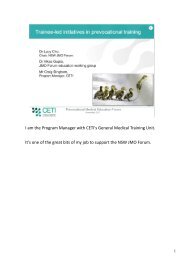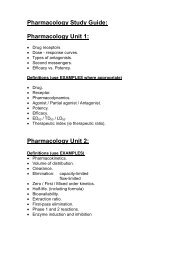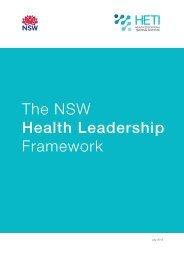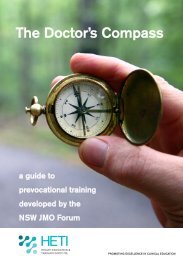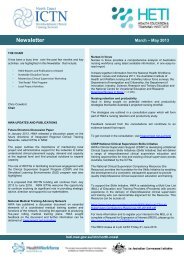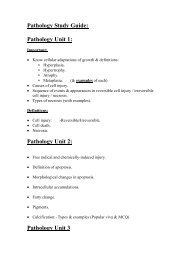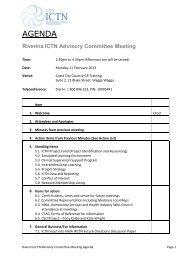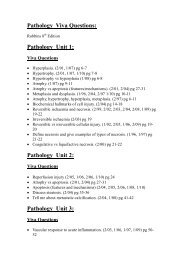Network principles for prevocational medical training - HETI
Network principles for prevocational medical training - HETI
Network principles for prevocational medical training - HETI
Create successful ePaper yourself
Turn your PDF publications into a flip-book with our unique Google optimized e-Paper software.
• z Coordination of <strong>training</strong><br />
• z Orientation to <strong>training</strong><br />
• z Accommodation of trainees on rotation.<br />
In networks with both rural and metropolitan home hospitals, the network committee must arrange a<br />
<strong>for</strong>mal agreement between sites covering:<br />
• z separate orientation at the rural or regional site <strong>for</strong> locally-based trainees in addition to any<br />
network orientation<br />
• z accommodation arrangements <strong>for</strong> both rural and metropolitan placements<br />
• z leave arrrangements<br />
• z term allocations.<br />
The underlying <strong>principles</strong> should be that the network committee<br />
• z governs the <strong>training</strong> network in an equitable and open manner, on the basis that all <strong>training</strong> sites<br />
are partners in the network<br />
• z allows all stakeholders (including trainees, supervisors, departmental directors and health<br />
service administrators) to participate actively in network governance<br />
• z distributes <strong>prevocational</strong> trainees across the network in ways that share work<strong>for</strong>ce equitably<br />
among sites and that share <strong>training</strong> opportunities equitably among trainees<br />
• z ensures that core orientation activities essential to a safe start at work are provided to all<br />
trainees in the network<br />
• z coordinates and monitor <strong>for</strong>mal education programs across the network to ensure that trainees<br />
do not have gaps or unnecessary repetition as they rotate through <strong>training</strong> sites<br />
• z promotes sharing of resources between <strong>training</strong> sites within the network to achieve efficiencies<br />
and maximise learning opportunities available to trainees.<br />
Rural and regional recruitment programs<br />
Rural preferential recruitment is a merit-based recruitment program <strong>for</strong> doctors who want to<br />
complete <strong>prevocational</strong> <strong>training</strong> in a rural setting. It helps build a sustainable rural and regional<br />
work<strong>for</strong>ce by giving priority to filling rural positions. Regional preferential allocation is a similar<br />
program that gives priority allocation to trainees willing to work in designated regional areas of<br />
higher work<strong>for</strong>ce need.<br />
These programs are important because health services in rural and regional areas continue to have<br />
<strong>medical</strong> work<strong>for</strong>ce shortages that affect equitable access to healthcare.<br />
The purpose of these programs is to facilitate recruitment to the facility, within the networks, and not<br />
to give preference <strong>for</strong> specific terms within the network, <strong>for</strong> which all trainees should have the same<br />
opportunity of access. Rural preferential recruits should not monopolise the most desirable <strong>training</strong><br />
terms at rural sites, but neither should they be excluded from desirable <strong>training</strong> terms at metropolitan<br />
sites. Not all rural or regional recruited <strong>prevocational</strong> trainees will pursue a generalist career —they<br />
deserve equal opportunity with other trainees to pursue their vocational interest, potentially leading<br />
to a subspecialty vocational practice in a rural or regional setting.<br />
A key goal <strong>for</strong> two years of <strong>prevocational</strong> <strong>training</strong> is to provide trainees with a range of experiences to<br />
in<strong>for</strong>m their career decisions, and give them a deeper understanding and of how care is delivered in<br />
the range of settings , which will then enhance care <strong>for</strong> the people of NSW into the future. The PGY2<br />
year increases the knowledge, experience and competency of all trainees, and if they have already<br />
identified their career choice the network is encouraged to help to facilitate this wherever possible.<br />
38



